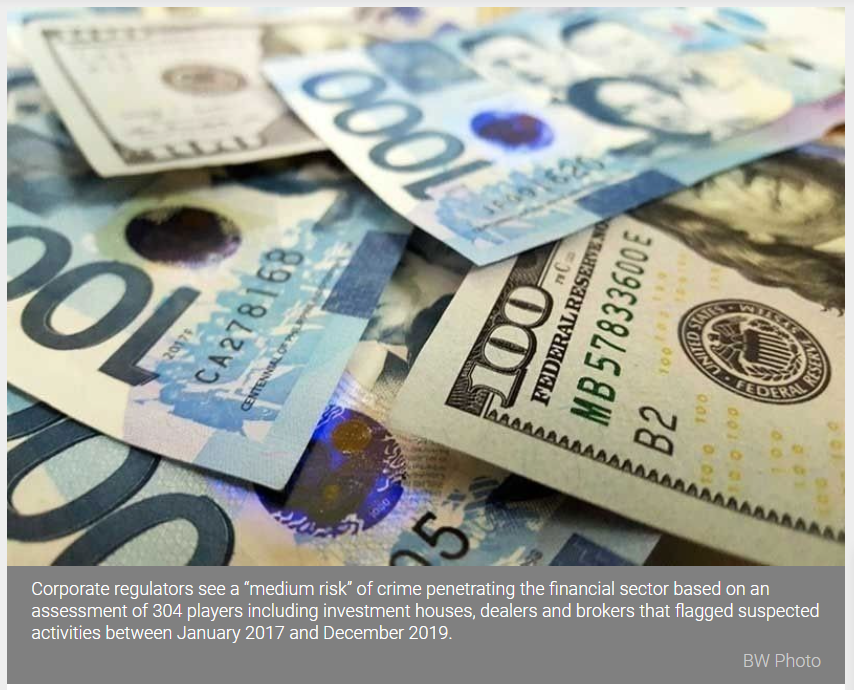Philippine financial sector found moderately exposed to crimes
MANILA, Philippines — The Philippines’ financial industry is modestly susceptible to getting used for criminal activities, including money laundering and plunder, raising the specter for further defenses in the fast-growing sector.
Corporate regulators see a “medium risk” of crime penetrating the financial sector based on an assessment of 304 players including investment houses, dealers and brokers that flagged suspected activities between January 2017 and December 2019.
It was unclear what exactly is meant by the rating, which the report released Tuesday said corresponds to “41-60%” in numerical terms. Whether that represents the scale of potential risk or the number of players vulnerable to attacks is also less clear. The Securities and Exchange Commission (SEC), which conducted the study, has yet to reply on queries as of this posting.
That said, the report encompasses a wide range of criminal activities predicated to money laundering and terrorist financing. That means that even if, as the report indicated, there is “extremely low or nil” chance of terrorism money going through the financial markets, related crimes like graft and plunder are more proliferating.
Out of 774 suspected deals reported to dirty money watchers during the survey period, 38 worth P25.03 million were found connected to plunder, while 19 worth P8.37 million were seen related to graft. Despite the Duterte administration’s drugs war, the SEC also saw seven but “rising” cases of drug trafficking worth P39,520, while five cases of fraud worth P11.64 million were also reported.
There are also much larger threats coming from money laundering. Ninety percent of the dubious reports filed with the government, involving P7.96 billion in funds, were for suspected money laundering. The report did not indicate whether suspicions were eventually confirmed through probes, but it did say that amounts were tagged for being too big for a given business, deviated from usual transactions or simply just a blatant effort to conceal it altogether.
Part of the challenge facing regulators in stopping these crimes emanate from the diversification of fund sources and complexity of their flows. Authorities appear to be shorthanded in monitoring where funds go especially since as the financial markets grow, larger amounts of liquidity get transacted by the day.
This is especially true as investment houses and underwriters handling large sums of money are seen with slightly higher than average risk of getting exposed to money laundering. Government securities dealers, in contrast, have lower risks.
“The cheap availability of internet access, increasing functionality of mobile phones and technological advancements that speed up transactions…have provided criminals with tools to escape detection or to hide the proceeds of their illegal activities,” SEC said.
While still appearing at manageable level, the consequences of failing to stop financial crime can be severe. At the very personal level, customers run the risk of losing cash in their accounts or portfolios. Falling prey to fraud also may hurt one’s reputation and integrity.
As a contingency, regulators want more regular reports from participating players as well as tighter on-site and off-site monitoring of transactions.
“Consequences for the securities sector broadly include a diminished level of market integrity leading to a general loss in public trust and confidence on the securities sector, as well as an adverse impact on earnings and revenue across the sector,” the report added.
Source: https://www.philstar.com/business/2021/05/18/2099115/philippine-financial-sector-found-moderately-exposed-crimes


 Thailand
Thailand




